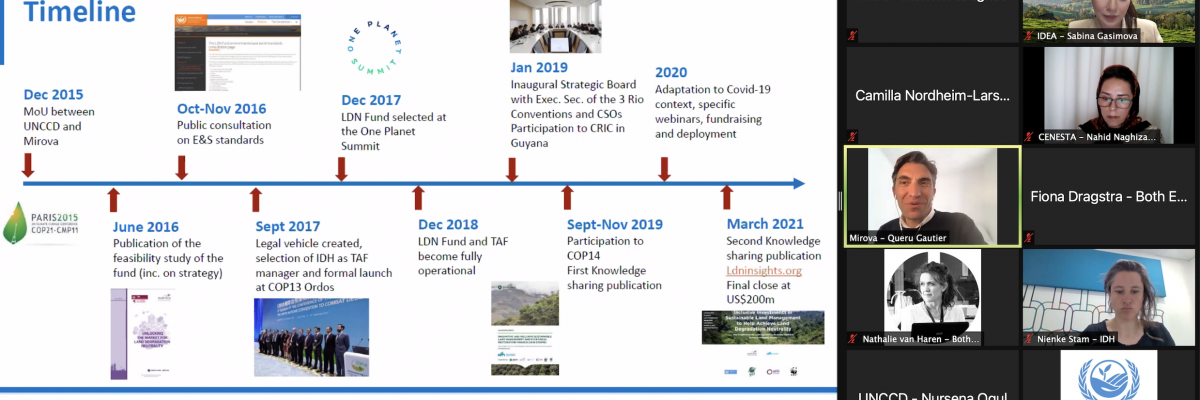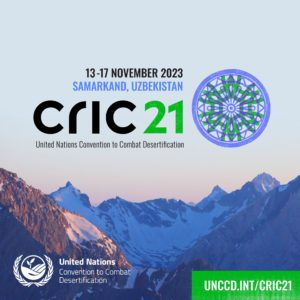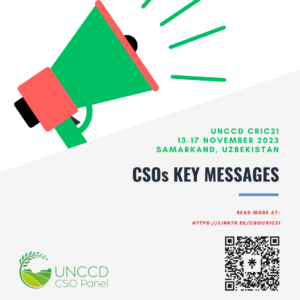Title and date of the Event
Dialogue between, the Civil Society Organizations (CSOs) accredited to the United Nations Convention to Combat Desertification (UNCCD) and LDN Fund stakeholders – The way toward stronger collaboration to achieve LDN, 17 May 2021.
Specific Objectives of the Event
Establishment of an interactive discussion among CSOs and LDN fund through:
- Inform CSOs on the financed projects by the LDNF focusing on the type of projects, the financing process, effects on communities and ecosystems considering environmental, social, and sustainability standards, and contribution to achieving LDN;
- Share the lessons learned on the funded projects that contributed to land restoration and sustainable land management while meeting the criteria of investment return;
- Exchange experiences, lessons learned, and recommendations from CSOs to the LDN fund regarding sustainable land management and land restoration;
- Strengthen collaboration to achieve LDN at all levels.
Expected Results
- Understanding and promoting the role of the CSOs, Indigenous Peoples and Local communities toward stronger collaboration to achieve LDN at various levels
Event Overview
The UNCCD CSOs panel in collaboration with the Land Degradation Neutrality Fund stakeholders (Mirova and IDH – the sustainable trade initiative) organized the event. Representatives of about 70 accredited CSOs of the UNCCD from different regions attended to the event.
The meeting served to increase the CSO’s awareness and understanding of the LDN Fund, its financing process, effects on communities and ecosystems, and contribution to achieving LDN, as well as share experiences and lessons learned on land restoration/SLM projects. The event also provided CSOs with the opportunity to showcase their actions, learn about investment opportunities, ask some questions and get feedback from the Fund managers.
During the meeting, participants were welcomed by the CSO Panel Chair and taken through a brief history on the establishment of the LDN Fund by the representative of the Global Mechanism.
Presentation by the LDN
Mirova and IDH further presented the Fund and spoke about the role of the Technical Assistance Facility (TAF), drawing up on the SDG target 15.3 and highlighting the importance of the Fund’s creation; its long-term support to sustainable land use projects and ecosystem restoration finance. Despite the impact of Covid-19, the Fund continued its activities and claimed, that a 200-million-dollar investment was a real achievement given the complexity and the challenges of the pandemic.
Furthermore, investment criteria, LDN indicators were examined in terms of impact criteria and financial/risk criteria. It was announced that a scientific tool was developed to measure contribution to the LDN. In terms of activities contributing to the LDN objective, restoration and rehabilitation, prevention and reduce of land degradation, and more sustainable land-use practices were specifically highlighted. CSOs were also informed on the challenges and risks of some financing cases.
Supported by TAF, the project of protecting land from degradation and improving livelihoods through hazelnut production in Bhutan was presented to the CSOs as an example of a project with environmental social benefits, seeing market opportunities and meeting market demand regionally, and, even globally.
Q & A session
Following the presentation of LDNF-supported project cases, CSOs raised questions about the application form, selection process and issues like seeking resource opportunities for drought-affected areas of India and prevention of landslides in Nepal. Some CSOs showed concerns on the scope of the Fund, which in their view, focuses more on the support of activities that are only economically viable, instead of being broader and helping all countries tackle the problem of desertification and land degradation.
As a response of these questions, it was clarified that the LDN fund and TAF are not the solutions to too many of the big problems that the world is facing today. And it’s not the only solution to tackle land degradation. It was highlighted that these big problems need public funding to relief situations and to come towards more inclusive solutions but in some cases, the private sector can also play a complementary role, and this should be considered as well.
Presentations by accredited CSOs of the UNCCD
Some accredited CSOs presented their projects on the field:
- ENDA from Senegal presented an action to empower communities to sustainably manage and valorize the resources of arid lands; combining farmer managed natural restoration and support to Balanites value-chains.
- SABUKO from Georgia presented the Endangered species program aiming at restoring grasslands and forests to preserve natural biodiversity
- Both ENDS from Netherlands presented the “Communities regreen the Sahel program“ which intend to regreen 200,000 hectares in 3 West Africa countries, while supporting farmers to have access to markets for non-timber forestry products.
The presentations paved way for interactive discussions on the way toward stronger collaboration based on CSOs experiences. The projects were evaluated by the representatives of Mirova and IDH and given suggestions on how to make a project more investable.
Sequence of the Events between CSOs and LDN Fund
- Since January 2019, the UNCCD Secretariat facilitated the participation of the CSO Panel representatives in the Strategic Board Meetings of The Land Degradation Neutrality (LDN) Fund. Following this involvement, the Panel members started a constructive consultation process with the accredited CSOs to receive their insights, concerns, and expectations on the LDN Fund operationalization from various regions.
- In preparation for the CRIC19 of the UNCCD, a synthesis report was developed by the CSO Panel members on the Operationalization of the Land Degradation Neutrality Fund (prepared report by the Global Mechanism (ICCD/CRIC(19)/3) reflecting the existing gaps, concerns, and expectations of the accredited CSOs to the LDN Fund;
- In response to the CSO’s concerns and questions and for more clarification, a Q&A document was developed by the LDN Fund;
- A CSOs Statement on LDN had developed and presented during CRIC19 of the UNCCD for further consideration along decision making process of the convention and more robust alliance and solidarity at global, regional, national, and local levels to avoid, reduce, and reverse land degradation and restore natural ecosystems;
- A Dialogue between CSOs and LDN Fund – The way toward stronger collaboration to achieve LDN;
Conclusion and Recommendations
It was clarified that LDN Fund and TAF are not the solutions to too many of the big problems that the world is facing today, and they can play a complementary role, therefore:
- CSOs and CBOs of IPs and LCs need more organized support from convention, funding agencies and national authorities for resource opportunities to promote their role at global, regional, national and local levels to contribute in LDN process through sustainable land management, combating desertification and restoration of degraded ecosystems in their customary territories and lands through environmentally, socially and economically viable actions;
- An inclusive range of capacity building, training of trainers (ToT) and resource mobilization is needed to support CSOs and CBOs for maximum contribution in LDN, combating desertification and land restoration at various levels;
- Along private sector investment for LDN Still more public funding is needed to relief situations and to come towards more inclusive solutions;
- Development of a participatory mechanism is needed for active involvement and collaboration of the accredited CSOs particularly for monitoring and evaluation of the LDN Fund projects at various levels.






